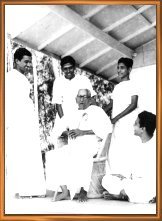
Were it not
for providence in the form of Guru Chandu Panicker, Dhananjayan would have
been working in some monotonous job in Kerala. Chandu Panicker taught Kathakali
and Sarada Hoffman and N S Jayalakshmi taught Bharatanaatyam. The training
imparted at Kalakshetra was painstakingly precise and the dance dramas
produced there taught the students set designing, discipline and administrative
acumen. The Dhananjayans have served as performing artistes and teachers
in the Dance and Academic Faculty in Kalakshetra.
As a scholarship
student at Kalakshetra, Dhananjayan learnt Kathakali, Bharatanaatyam, mridangam
and music. Shanta trained in Bharatanaatyam and music apart from other
subjects for nearly a decade. Dhananjayan also displayed an interest in
academics. Even as they evolved into world-renowned professional artists
and then into teachers, Dhananjayan continued to shape his artistic experience
with academic learning.
Shanta matured
in dancing and outshone other girls. With Rukmini Devi as mentor and Chandu
Panickar as Guru, Shanta and Dhananjayan blossomed into outstanding dancers.
Shanta enacted the female lead opposite Dhananjayan in many Kalakshetra
compositions. They were paired opposite each other as Rama and Sita or
Chitralekha and Aniruddha etc. Dhananjayan played the role of Arjuna when
93-year-old Chandu Panickar played the role of the Brahmin in ‘Santhanagopalan’
in the premises of the Subramanya Temple in Payyanur.
Dhananjayan made
his feelings clear to Shanta when he was 18, but she kept him in suspense.
He thought his lower economic status was the hurdle, when Shanta left Kalakshetra
after her post graduation in 1962 and taught dance in Malaysia. She started
receiving proposals for marriage, which she turned down. When her parents
were convinced that Shanta’s interest in marrying Dhananjayan was genuine,
they gave their blessings and Shanta returned to India. They tied the knot
in 1966 at the Guruvayoor temple in Kerala. Maybe each would have independently
carved a niche in the dance world, but together they represented a force,
which would take the world of dance by storm.

